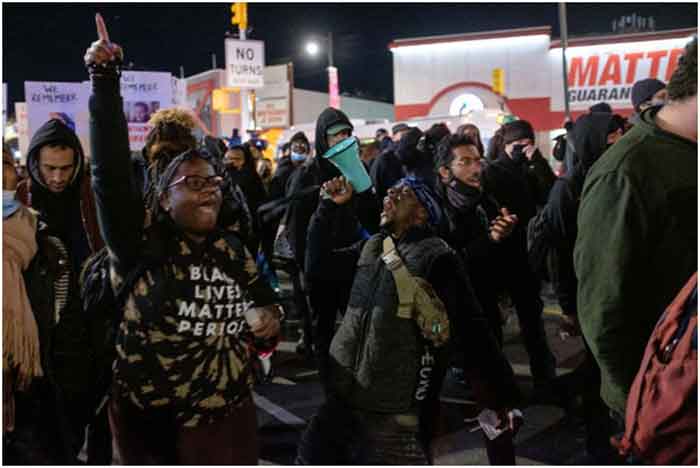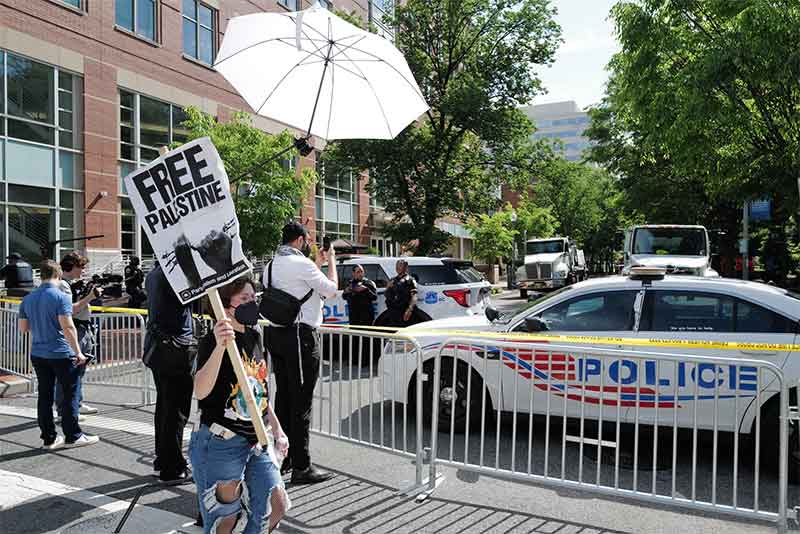
The on-going Black Lives Matter protests are beyond incredible. Pandemic rages. And yet week after week people courageously persist. Duration unprecedented. Intensity amazing. The protests are inspiring. But what is the underlying logic? Where are the protests headed?
Indeed, stepping back just a bit, what is the purpose of any activist protest? Set aside that tiny numbers engage for fun or to meet people – not that there is anything wrong with such desires in a world like ours. The overwhelming desire of protests is of course to win change. But how?
Put differently, why do activists think their actions about racism, about wars, about inequality, about global warming, about – whatever – can win change?
Some might say it can occur due to activism raising new issues, causing new thoughts, engendering new views. And all that is certainly profoundly important. And all that can and does happen. It is certainly part of protest logic. But change the issues, thoughts, and views of whom?
Social change in our ridiculously top down society is regrettably, ultimately, a matter of those in power behaving other than they have in the past. But the dissent of people in the streets doesn’t rationally convince those in power that their past thoughts, views, and choices should not be their future thoughts, views, and choices. It does that for some participants. It does that for some bystanders. And that matters, hugely. But for elites who have to pull levers for change to ensue, more often people in the street tend to cause those in the suites, if they feel anything at all, to feel more strongly opposed to sought changes, and, in the rare instances when someone with the power required to impose a new policy does get woke – he or she then almost always gets removed or, to avoid being removed, remains silent.
But if activism doesn’t rationally change power brokers’ minds, how does activism get power brokers to pull levers that ensure changes?
Answer: Activism wins change by “raising social costs” such that those who enact policies feel it is in their interest to make sought changes because if they don’t the cost to them of ever increasing activism will be greater than the cost to them of succumbing to the demand for change.
That is a clumsy bunch of words, but also trivially simple. Even so, it has many important implications and it raises, as well, some questions. What “social costs” matter? What “social costs” pressure elites? And how do we conduct our activism to best raise relevant “social costs” high enough to win change?
And so we come to the heart of this discussion. How are the current widespread demonstrations and activism winning various changes? Why are elites giving in, more than anyone would have predicted some weeks back. Hells bells, why are sports talk shows spending more time discussing policing, even systemic racism, even tactics and solutions, then sports scores?
Answer: Demonstrations are raising social costs.
How might demonstrations win still more change?
Answer: They can raise costs still higher, or raise new costs.
But what are the costs that rallies, marches, and civil disobedience, and for that matter organizing outreach, webinars, and all manner of educationals raise?
We can be sure it is not the financial cost of cleaning up after protests. That cost is marginal, manageable, and thus of zero social change consequence to the powers that be. It is not even the continuation of our activities, without their growing. That too is marginal and manageable and thus of little consequence. Imagine a recurring rally, for example, every week, even every other day. If the action never grows it will at most be annoying. Stable, static opposition portends going nowhere. The cost of opposition is precisely the danger of its continued growth. The cost of opposition is precisely the danger of a steady diversification and enlargement of focus. It is the future threat that matters, not recurring activity that doesn’t grow.
When elites are asked to do X – whatever X may be, they will do it at whatever cost doing it entails, only when they fear that not doing it will ultimately cost them more. And the fact that cost to their beloved business as usual is the only reason they will do what is sought is why they have the power. It is the job of power to persist in business as usual unless business as usual is at risk. It is the job of power to defend business as usual including when the best defense, because of the growing threat, the growing social cost, is concessions. And we are not talking dollar costs. They are typically minor. Easily affordable. We are talking threatened loss of means of accruing wealth and threatened loss of power as evidenced by a trajectory of growing opposition that is threatening to grow still more.
Elites give in to strikes when they fear not giving in will lead workers to demand and win even more. They give in on affirmative action, or on anything at all, when they fear the consequences of not giving in more than they fear the consequences of giving in. The cost of cleaning up after demonstrators barely registers enough to win anything at all. In fact, even large demonstrations, if they recur but don’t grow, are no big deal.
What matters, what constitutes social cost – growing social costs – to the eyes of the elites who have their hands in position to pull levers to meet demands, is steadily increasing numbers, steadily growing commitment, steadily growing incursions on their own overall operations, and especially a steadily enlarging focus and steadily diversifying demands that augur still more to come.
It follows that breaking lots of windows is not raising social costs unless it grows the movement, grows resistance, grows commitment, and diversifies demands. The truth is, however, breaking windows rarely if ever has any such effects. It often, despite the hopes of practitioners, even does the reverse – and that’s without even taking into account its providing an excuse and justification for repression. Increasing the number of participants in actions, increasing their commitment as evidenced by their engaging in civil disobedience, and perhaps most critical, simultaneously deepening and enlarging stated aims all convey increasing threats that in turn warrant meeting demands.
The job of the rebel, resister, radical, and revolutionary is to consider circumstances and undertake activities best suited to winning desired gains and to simultaneously paving the way toward winning still more gains on the way to attaining transformed social relations.
Enlarging support and awareness. Nurturing commitment and visibly demonstrating a threat of more to come. These are our tasks. It can include face to face discussion and organizing, collective educationals, rallies, marches, boycotts, and occupations. It can include creating organization and means of outreach. It can include and indeed should include engineering shifts in political power. Protests should not always remain at the level of asking elites to change. Our efforts should also create the conditions of a political shift by which the traditionally dispossessed, oppressed, and marginalized win greater and greater levels of power.
We seek radical social transformation. But short of that, our actions should not only force elites to respond to our demands they should also expand democracy and plant the seeds of a new future in the present. It is rare that trashing or violently engaging with police (other than for necessary self defense) enlarges support, grows awareness, nurtures commitment, and visibly demonstrates a threat of more of all that to come. Raise social costs. Don’t stabilize them. Don’t reduce them. Raise them.
[Collective 20 is a group of writers located in different places throughout the globe. Some young, some older; some long-time organizers and writers, others just getting started, but all equally dedicated to offering analysis, vision, and strategy useful for winning a vastly better society than we currently endure. The members of Collective 20 hope their contributions concerning social, political, economic, and environmental issues will generate more useful content and better outreach through a collective publication effort as opposed to individuals doing so on their own. Collective 20’s cumulative work can be found at collective20.org, where you can learn more about the group, see an archive of its publications, and comment on its work.]
SIGN UP FOR COUNTERCURRENTS DAILY NEWSLETTER













































